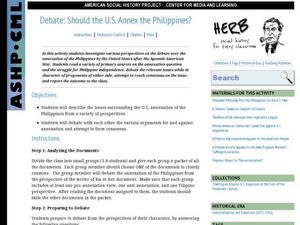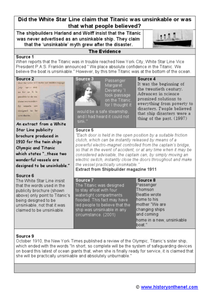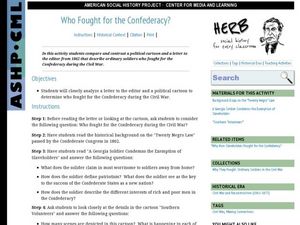Curated OER
Debate: Should the U.S. Annex the Philippines?
Building an argument with supporting evidence is a vital skill. Learners engage in a debate over the annexation of the Philippines after the Spanish-American War. They take on the perspective of an individual from that time period,...
Curated OER
Iran Hostage Crisis: Reading Primary Documents
Following brief instruction about the Iran Hostage Crisis during Jimmy Carter's presidency, small groups read three-page sections from the diary of hostage Robert C. Ode. They write editorials from the perspective of either U.S. citizens...
Curated OER
Interpreting Foundation Documents of the American Republic
Explore early American documents that qualify as primary sources. Tenth and eleventh graders use the provided worksheets to analyze the texts of the Articles of Association, the Declaration of Independence, the Articles of Confederation,...
Curated OER
Worksheet for Analysis of a Letter
Dear Nancy, how do you analyze a letter? Love, Trez. Dear Trez, you use a Letter Analysis Worksheet. Love, Nancy.
This richly detailed worksheet provides multiple questions that lead researchers step-by-step through the process of...
Curated OER
The Third Estate
Kids read a translated version of Abbe Sieyes' document, The Third Estate. This document is shown in its original form and as an English translation. After reading the text they answer three critical thinking question to show their...
Curated OER
The Declaration of Independence
Learners analyze the Declaration of Independence. They identify and describe various sections of the document then discuss how the colonists responded to it. As a culminating activity, they write their own declarations of independence as...
Curated OER
My Story and History: Peeking into the Past with Paintings
Consider how you can use a visual source, such as a painting, to learn about a historical time or event. Young learners discuss primary sources and how they differ from secondary sources, then analyze the painting Mother and Child by...
Curated OER
Interpreting Photographs: Part One
Photography is a wonderful artistic medium used to express feelings, historical events, and nature. This worksheet provides three critical-analysis questions that require learners to take an in-depth look a photograph both physically and...
Curated OER
Social Studies Current Event Worksheet
Who, what, when, where, why, and how. This current events instructional activity uses the traditional news article format and asks reviewers to record information included in a self-selected, current events article. Class members then...
Curated OER
Differing Federal Responses to the Great Depression: Letter Analysis
Young analysts examine two letters, one written by President Hoover and one written by FDR. Each letter contains that president's response to the role of the Federal Government during times of crisis (The Great Depression). They analyze...
Curated OER
Immigration Debates in the Era of "Open Gates"
Young social historians examine immigration debates of the early 20th century through primary sources, such as political cartoons. They analyze the material, discuss their findings, and complete a critical thinking worksheet. All...
Curated OER
Declaration of the Rights of Man
As your historians examine the French Revolution, have them read "Declaration of the Rights of Man" in its entirety; it's not very long, and it gives them a great authenticity to understanding the efforts of the French people. After...
Curated OER
Who Fought for the Union?
Learners read New York Times articles, letters, and listen to songs written from a soldier's perspective during the Civil War in order to understand who was fighting in the Union Army. This is a great lesson, complete with weblinks,...
Curated OER
The Poetry of Chinese Immigration
Numerous people from China immigrated to the US during the era of industrialization and expansion. Provide your class with a glimpse into the life of a Chinese immigrant through the poetry they left behind. They then compose a poem of...
Curated OER
"In Defense of My Race and Country": African-American Soldiers on Why They Are Fighting
Why would an African-American slave fight in the Civil War? Read and analyze primary source documents to understand the ex-slave perspective on fighting in the Union Army. Everything to complete this lesson is included.
Curated OER
Create a Walking Tour of San Francisco's Chinatown
Take a tour of Chinatown as it was in the 1800's. Analyzing primary source images and documents, learners will gain a better understanding of the myths and misconceptions of Chinese immigrants during the 1800's. They create a pamphlet to...
Curated OER
Liberty for All: Voices from the Revolution
Did the Declaration of Independence really intend to grant liberty for all? Get your class thinking about historical perspective with documents relaying the experiences of women, white men, and African-Americans during the Revolutionary...
Curated OER
"Uncle Sam's Got Himself in a Terrible Jam": Protest Music and the Vietnam War
"And it's one, two, three...what are we fighting for?" Use music to assess the climate of protest during the Vietnam War, listening to and analyzing Country Joe MacDonald's "I-Feel-Like-I'm-Fixin'-To-Die Rag" (lyrics included)....
Curated OER
Jeffersonianism at the Bar
Eleventh graders participate in a political roundtable discussion. In this Jeffersonianism lesson, 11th graders role play individuals from the 19th century and discuss issues of the Federalist period.
Curated OER
1960 America: Foreign Policy
The 1960's marked shifts in American culture, politics, and policy. Your class groups up to research a series of primary source documents resulting in a timeline and a 15 minute oral presentation. Active learning all the way.
Curated OER
Writings of Confucius
Ancient philosophy can relate to modern thought! Quotations from Confucius. Help your historians connect with ancient Chinese words of wisdom, as they respond to 2 display questions and 1 referential question. They consider how they...
Curated OER
White Star Line and the Titanic
Was the Titanic advertised as an unsinkable ship, or was it just what the public believed? For this analysis activity, historians examine both primary and secondary sources to determine the answer to this question and the reliability of...
Curated OER
Forty Acres? The Question of Land at the War's End
Should land be redistributed to former slaves after the Civil War? This essential question guides a instructional activity on the Reconstruction Era, as learners analyze primary sources (linked), recording responses on a worksheet...
Curated OER
Who Fought for the Confederacy?
Did the Confederate Army really consist of southern volunteers? Using primary sources, historians examine the story behind the "Twenty Negro Law" and realities of conscription during the Civil War. A letter and a lithograph (included as...

























